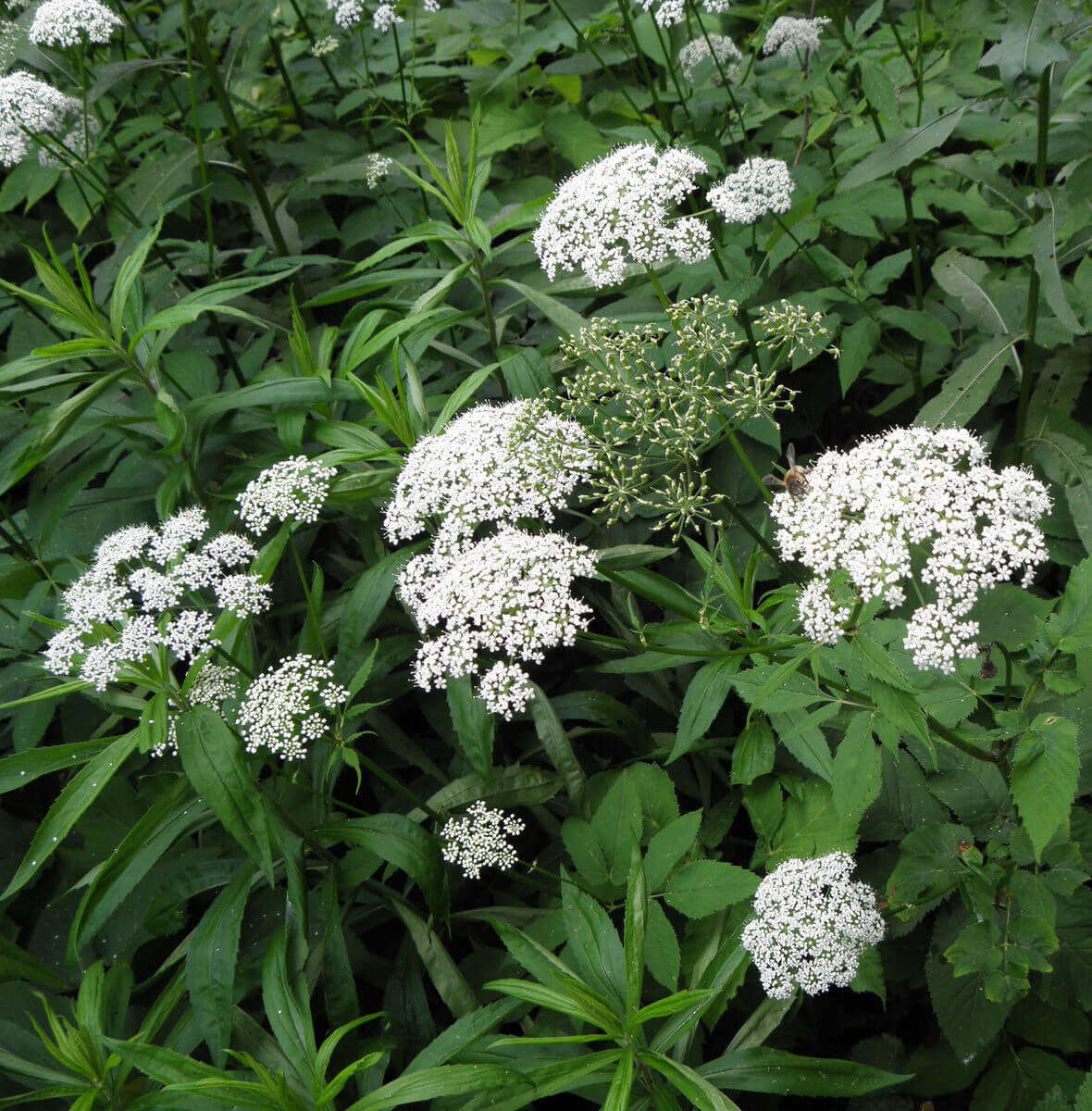- +033 2572 7171
- info@dhanvantary.com

4.5 Rating | 4500 Review

4.5 Rating | 4500 Review
Aegopodium podagraria or ground elder is a spreading perennial weed. It spreads by underground stems (rhizomes) and can be quite aggressive. It comes under family Apiaceae, native to europe and northern asia it was brought to north america as a decorative plant and has been used as medicine for treating gout since ancient times. It also shows antioxidant, anti-inflammatory, antiproliferative, and antimycobacterial properties. Their cooked leaves are edible and were cultivated as a food crop in the middle ages.

Kingdom
Plantae
Order
Apiales
Family
Apiaceae
Phylum
Streptophyta
Class
Equisetopsida
Irish – Lus an easpaig
French – Herbe aux goutteux
Italian – Girardina silvestre
German – Geissfuss
Kingdom – Plantae
Order – Fabales
Family – Fabaceae
Sub-Family – Mimosaceae
Genus – Acacia
Species – A.farnesiana
Phylum – Spermatophyta
Class – Dicotyledonae
Ground elder natural habitat is distributed among forests, deciduous woodlands, riparian areas, shrub lands, shorelines and gardens. It is present in areas like Europe (Italy, France, UK, Denmark etc.), USA (Alaska), Australia, New Zealand and Japan. It grows best in partial sun to full shade in well-drained, humid moist soil.
Bhavaprakash nighantu: Vatadi varga
Raja nighantu: Shalmalyadi varga
Dhanvantari nighantu: Amradi varga
Kaiyadeva nighantu: Aushdhi varga
Susruta: Salasaradi varga
Rasa (Taste) – Kashya (astringent), tikta (bitter)
Guna (Quality) – Laghu (light to digest), Ruksha (dry)
Vipaka(after digestion) – Katu(pungent)
Effect Of Tridosha – Kapha pitta shamak (reduces the vitiated kapha and pitta dosha)
Arthritis and Gout: Aegopodium podagraria is the most common herb for treating inflammatory conditions like rheumatism and arthritis, which has been utilized in folk medicine since ancient times. Its specific name, “podagraria,” means podagra, described for gout condition. It was thought to help fight conditions related to rheumatism. All parts of the plant are antirheumatic. Infusions/tea made from dried leaves are recommended to treat gout and sciatica.
Diuretic Properties: Ground elder help to treat inflammation of kidneys, it acts as diuretics thus removes toxins out of the body. It is also helpful for gastrointestinal problems.
Metabolism: Ground elder is beneficial for improving metabolism. Chlorogenic acid presents function as a naturally occurring anti-obesity chemical, hence regulating excess body fat.
Supplements: Aegopodium podagraria can be used as potassium and micro-macro elements supplement for various health issues.
Culinary Significance: Ground elder is a plant that can be eaten in addition to its medical uses. In spring, young sprouts were consumed and cooked in soup.
Other Uses: Aegopodium podagraria leaves can help prevent and treat disorders caused by oxidative stress, such as inflammatory conditions, neurological diseases and cardiovascular diseases. They can also be a valuable source of antioxidants in a regular diet.
Wound treatment: Fresh leaves of ground elder have been administered as dressings for burns, stings and wounds in order to speed up healing because of its anti-inflammatory properties.
It is attractively employed for covering vast ground cover, borders, containers, and other ornamental reasons due to its attractive foliage.
Leaves, flowers, stems and rhizomes
Decoction : 14-15 gm of dried leaves in 250 ml of water
Powder : 400mg
As seen above Aegopodium podagraria is a herb of medicinal use in Apiaceae family, this family also consist of many other ayurvedic herbs more or less with similar functions as that of ground elder thus can be used as an alternative. Let’s have a look at these alternatives.
Wild carrot has antilithic, diuretic, antiseptic, anti-inflammatory and carminative properties, helps to treat gout, promotes cardiac functions, treat kidney abnormalities, promotes digestion, aids in weight loss, combat respiratory issues, boosts eye health and relieves liver problems.
It balances the Pitta doshas and Kapha doshas and can aggravate the Vata doshas.
Numerous pharmacological effects of coriander have been documented, like antioxidant, antidiabetic, antimutagenic, anthelmintic, and diuretic, anticonvulsant, antifungal, anticancer, anxiolytic, hepatoprotective, and anti-ulcer, sedative and cholesterol-lowering properties. Their seeds are ingested to ease pain, inflammation, rheumatoid arthritis, and have been prescribed to relieve gastrointestinal disorders such as flatulence, diarrhea and nausea, whereas the decoction of coriander was believed to treat redness in eyes and mouth ulcers.
It balances all three doshas Vata, Pitta and Kapha.
Other herbs that have similar functions that of ground elder but not belong to their family are:
Turmeric has anti-inflammatory, antioxidant, antimicrobial, anticancer, antiobesity, cardioprotective, and neuroprotective effects. In Ayurvedic practices, turmeric is said to provide many health benefits as it is used to treat arthritis, improves digestion, dissolve gallstone, regulates menstruation and promotes general bodily health.
It is good for all doshas. Its heating property balances Kapha and Vata doshas, while the astringent taste balances the Pitta dosha.
Guggul has antioxidant, anti-inflammatory and antilipidemic properties generally used to treat various diseases including hyper-cholesterolemia, obesity, rheumatism, hypothyroidism, and manage blood sugar levels.
It balances all three doshas of Vata, Pitta and Kapha.
Aegopodium podagraria or ground elder or goutweed was traditionally used as a medicinal herb for treating gouts in Europe although its use was not widespread. Nowadays more and more research has shown that this is not merely a weedy plant but also has many health benefits other than treating gout. Increasing consciousness about health, people accepted this weed in their day to day life. In ayurveda also we have many alternatives to that of ground elder which can be used for more or less same purpose, of course not all benefits can be taken using these alternatives as a single component present in a herb has its own valuable effect. Ongoing researchers will be more helpful to know more about this miraculous herb to treat mankind.
